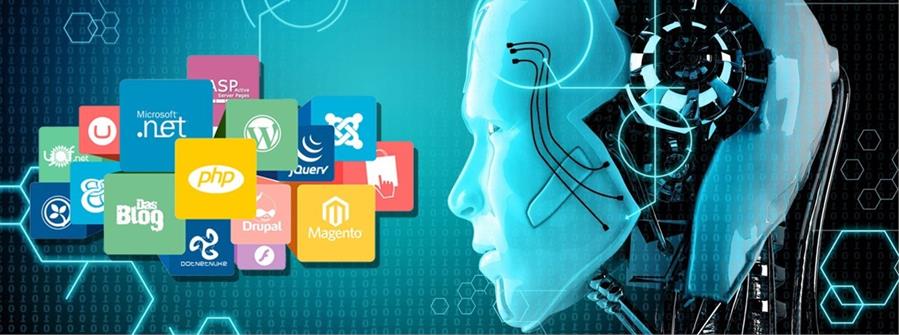
Artificial intelligence (AI) is transforming the way we interact with technology, and the world of web design and development is no exception. AI is revolutionizing the way we create and optimize websites, providing custom website design services and enhancing user experiences. In this article, we will explore the ways in which AI is changing web design and development, including the advantages of using AI in web design, how AI is being used in website development, and the future of AI in web design.

Advantages of Using AI in Web Design
1. Improved User Experience: AI can analyze user behavior and preferences to create personalized and intuitive website experiences that are tailored to individual users.
2. Enhanced Efficiency: AI can automate repetitive tasks, such as coding and testing, allowing developers to focus on more complex and creative aspects of website design.
3. Better SEO: AI can analyze website data and identify ways to optimize content for search engines, improving website visibility and search engine rankings.
4. Increased Security: AI can help protect websites from cyber threats by analyzing data and detecting suspicious activity.
5. Cost-Effective: By automating certain aspects of website design and development, AI can help reduce costs and save time.
6. Real-Time Analytics: AI can provide real-time analytics and insights into website performance, allowing developers to quickly identify and address issues.
7. Predictive Maintenance: AI can analyze website data and identify potential issues before they occur, allowing developers to proactively address and prevent website downtime or crashes.
8. Personalized Recommendations: AI can analyze user data to provide personalized recommendations for products or services, improving customer engagement and satisfaction.
9. Multilingual Support: AI can provide multilingual support for websites, allowing businesses to reach a global audience and improve user experiences for non-native speakers.
10. Scalability: AI-powered website development and design can be easily scaled to accommodate increasing website traffic and evolving business needs.
How AI is Being Used in Website Development
1. Automated Coding: AI can analyze website designs and generate code automatically, reducing the time and effort required for website development.
2. Natural Language Processing (NLP): NLP is a subfield of AI that allows computers to understand and interpret human language. NLP can be used to create conversational interfaces, chatbots, and voice assistants for websites.
3. Image and Video Recognition: AI can analyze images and videos to identify and tag content, making it easier to organize and search for media on websites.
4. Personalization: AI can analyze user behavior and preferences to create personalized website experiences that are tailored to individual users.
5. Voice Search Optimization: AI can help optimize website content for voice search, which is becoming increasingly popular with the rise of smart speakers and voice assistants.
6. Cybersecurity: AI can help protect websites from cyber threats, including malware, phishing attacks, and DDoS attacks, by analyzing website data and detecting suspicious activity.
7. Performance Optimization: AI can optimize website performance by analyzing data on page load times, site speed, and other metrics and identifying areas for improvement.
8. Data Analysis: AI can analyze website data to provide insights into user behavior, such as which pages are most popular or which products are frequently viewed.
9. Natural Language Generation (NLG): NLG is a subfield of AI that allows computers to generate human-like text. NLG can be used to create website content, product descriptions, and other written materials.
10. Virtual Assistants: AI-powered virtual assistants can help website visitors find information and answer questions in real-time, improving customer engagement and satisfaction.
The Future of AI in Web Design
As AI technology continues to evolve, we can expect to see even more innovative uses for AI in web design and development. Here are some potential future applications of AI in web design:
1. Augmented Reality (AR): AR technology can enhance website experiences by overlaying digital content onto the real world. AI can help create and optimize AR experiences for websites.
2. Predictive Analytics: AI can analyze website data to make predictions about user behavior and identify opportunities for optimization.
3. Dynamic Content Generation: AI can generate dynamic website content that changes based on user behavior and preferences.
4. Advanced Chatbots: AI-powered chatbots can provide more personalized and conversational website experiences, improving customer engagement and satisfaction.
5. Sentiment Analysis: AI can analyze website data to determine the sentiment of users and provide insights into how to improve website experiences.
6. Accessibility: AI can help make websites more accessible for people with disabilities by providing voice-controlled navigation, closed captioning, and other features.
7. A/B Testing: AI can help optimize website design and content by conducting A/B testing and analyzing user behavior to determine which versions of a website perform better.
8. Customer Service: AI-powered chatbots and virtual assistants can provide 24/7 customer service, answering questions and resolving issues in real-time.
9. Content Creation: AI can generate website content, including product descriptions, blog posts, and social media updates, reducing the time and effort required for content creation.
10. Design Automation: AI can automate certain aspects of website design, such as layout and color schemes, providing a more consistent and visually appealing user experience.
In conclusion, AI is revolutionizing the world of web design and development, providing businesses with innovative solutions to create custom, engaging, and optimized websites. By incorporating AI technology into their web design and development processes, businesses can stay ahead of the curve and achieve greater success in the digital landscape. As AI technology continues to evolve, the possibilities for AI in web design and development are endless, and businesses that embrace this technology are sure to reap the rewards.
